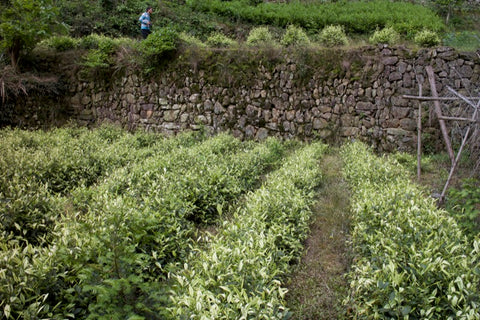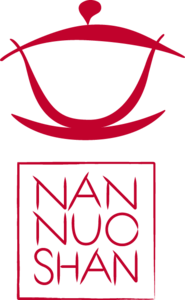The Big Buddha Long Jing
Hangzhou, 4th May
Lunchtime, high-speed train station. Hai Yi’s train from Anhui arrives just few minutes after mine. We will travel together in the Zhenjiang province for the next couple of days to search green tea, with focus on Long Jing.
We first visit a wholesale tea market just outside of town. Many shops, one next to the other, all selling the same kind of teas. Difficult choice. Most teas come from a mountain area in southern Zhejiang. One tea attracts my attention. A Long Jing from Lishui. Large leaves, therefore cheap, but very sweet and full in taste. I don’t recognize the typical chestnut fragrance of the original Xi Hu (West lake) Long Jing; neither it’s roasted flavor. Nonetheless an interesting tea, much much cheaper than the Long Jing produces near the West lake. I collect the business card of the shop owner and a sample for latter evaluation. Hai Yi buys 3 kg of Lishui Long Jing as a present for its family; the fancy gift packaging costs more than the leaves!


A wholesale tea market just outside of Hangzhou. Many shops, one next to each other, or selling the same kind of teas.
Authentic Long Jing is produced near the West lake, located next to Hangzhou; actually part of the lake is inside the city. The most renewed Long Jing is produced in the Long Jing village, just 30 minutes bus ride from the center of Hangzhou.
Long Jing is the most famous green tea in China; production around the West lake is by far not enough to supply Chinese inland demand. Long Jing is produced in every corner of China, even in Sichuan, in the far southwest of the country. Most of the tea sold in Hangzhou –and even in the Long Jing village itself– comes from other region, but it’s sold as original.
Within the Zhejiang province few areas are famous for producing outstanding, however not authentic, Long Jing. One of this is the Xinchang county.
And Xichang is where Hai Yi and I are heading today. We take a bus in the late afternoon and within a few hours are already in front of the already closed Xinchang tea market, in the suburgs of the city.
We drink a couple of teas in a shop next to the market and go early to bed. Tomorrow will be a long and tough day; longer and tougher than we think.
Xinchang, 5th May
Finding tea in Xinchang is very easy, you don’t even need to search, tea will find you. Finding affordable tea is also not difficult, for many producers do personally sell tea in the market; first hand, so low price. But our mission here in Xinchang is all but easy. We would like to find an organic tea garden. We are not interested in big companies with organic certification; as absurd as it may sound, organic tea is not necessarily the best. Why? The organic certification is very expensive; only large companies can effort it. And in big factories tea is a mass product, not a quality product.
I am rather searching farmers willing to differentiate from the concurrence by avoiding completely the use of pesticides, herbicides and chemical fertilizer.
It’s rainy and hot. I am carrying two heavy backpacks. We spend the whole morning in lengthy discussions with tens of farmers. Communication in China is so hard! Everyone gets on my nerves. Even for the simplest question they have to speak for minutes and, at the end, I don’t get any answer. No wonder; I should have no expectation from a language that have no words for “YES” and “NO.” If English is math, Mandarin is philosophy. At noon I am really fed up. I take a break for lunch, breath deeply, and continue the search outside the market.




Xinchang tea market; old and young tea sellers.
Sunset, on a hill outside of town. The long search rewarded me at the end of the day. A tea garden, managed by the government till the seventies, has been unused for long time until, few years ago, a farmer started to pick the leaves of the old bushes. The bushes in the meanwhile became trees about double my size. Long Jing from a wild tea garden; isn’t it what I was searching for?



A wild tea garden, unused for decades, on a hill not far from Xinchang. A farmer recently started picking the leaves of the tall tea bushes –now trees– to produce wild Long Jing.
We spent the evening in the rural house of the farmers, eat the “crepes” made by her mum and then go back to the hotel.




We collect the dinner in the wood (fresh-water prawns), go back home and dine with the farmer's parents and daughter.
Xinchang, 6th May
8am. A smiling man and his chubby and quiet son pick us up at the hotel; we drive to their small village. The water of the rivers turns from brown to green and blue while we dive up the mountains.


We drive up the mountains to visit a village producing organic Long Jing.
In their village live 501 people. Our driver has been the administrator of the village for the past 27 years, non stop. He turned a poor settlement into a wealthy community. Inventive and far-sighted, he created a tea cooperative and obtained organic certification for all the tea gardens managed by the village! Few years ago, Hu Jin Tao awarded he in Bejing as “quan guo lao mo” (national workers model); a recognition given to the best township manager of the whole China.


Gabriele pretending being Hu Jin Tao with the administrator of the organic Long Jing village.
Many little plots of tea bushes up of steep narrow valleys, just outside of the village. Each tea garden extends just over a few tens of square meters. Two tea plants are cultivated here, Qun Ti Zhong –a local plant– and Bai Ya Yi Hao –the white-leaves bushes famous for Anji Bai Cha.


Organic tea gardens. Note the gras growing next to the bushes, sign that no herbicides are used.
According to legend, thousands of years ago the Emperor Shennong was lying under a tree when a few leaves fell into his water cup. The water turned into a sweet and aromatic beverage; and so tea was discovered.
A friend and customer from Berlin asked me to steep fresh tea leaves; she wants to know if the taste really changes as described. And so I do here at the village. Grassy, very grassy, and astringent. With some imagination I can feel some hints of sweetness in the aftertaste; more in the steeped white leaves of Anji Bai Cha, which are lighter and less bitter. So I cannot confirm the legend, but maybe Shennong had superior taste buds.
Note: after I wrote the last paragraph a friend explained me that Shennong tea was bitter indeed! The aftertaste, however, was sweet. So maybe I should confirm the legend. I am confused :-)


Tasting fresh tea leaves steeped in hot water to confirm (or refute) that tea was discovered by chance when fresh leaves fell from the branch into a cup of hot water.
At lunch we go back to Xinchang, pack the tea for Nannuoshan and rush to the bus station to catch a bus to Hangzhou.
Beside Da Fo Long Jing (Da Fo means Big Buddha, this is the name of the Long Jing produced in Xinchang) I purchase also a local black tea produced with the same leaves.
In the past I already bumped into green tea farmers trying to produce also black tea; all miserable attempts, as they don’t master the technic to properly oxidize the leaves.
The black tea of the village, however, surprises me for its brisk and clean flavor.
Written by Gabriele

